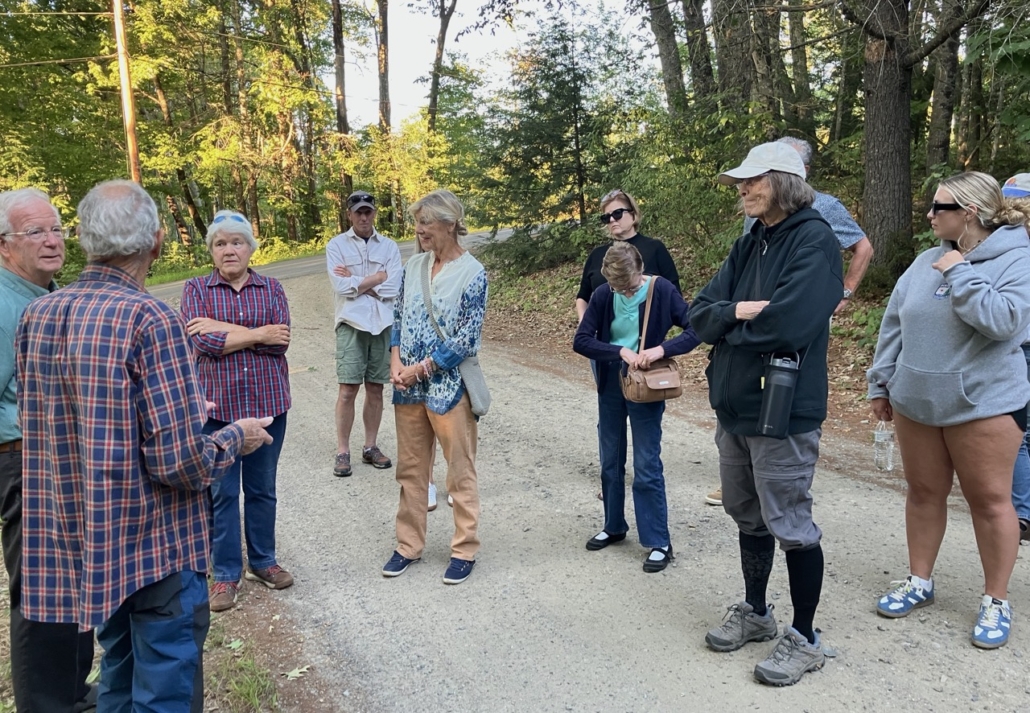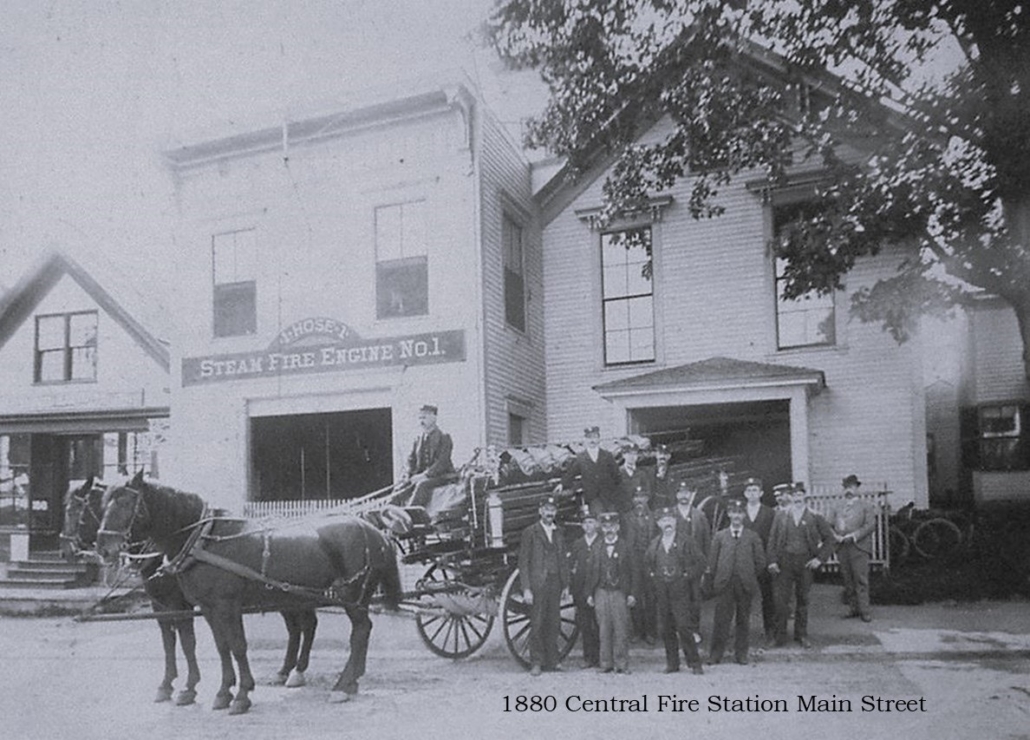The history and the fate of the building at 363 Route 3
by Mary Grow
Chapter One: the Building’s Story
Historical information on the wooden building at 363 Route 3, in China, comes from a combination of town records, provided by China Town Manager Rebecca Hapgood and Codes Enforcement Officer Nicholas French, and local people’s memories.
These sources say that Richard and Rita Hussey had the building constructed in 1990, on the lot they bought in August 1989. Over the years, it went through physical changes and changes of use, as businesses came and went.
A tax record says it started as a one-story building with a basement and an unfinished attic. The second floor got finished, and once served as an apartment. Sometimes the building had a deck, sometimes a drive-up window.
Its first tenant was a Cannon Towel outlet. Beale’s Video rented it, either before or after it was home to Thomas Holyoke’s Top Ten Donuts and More, in 2003.
Around 2004 and/or 2005, Colleen Smith’s South China Coffee Shop was the tenant. In 2007, a second-floor apartment was added above the driving school then using the main floor.
In 2011, Norman Elvin, an Augusta businessman doing business as G & E Realty, bought the building. He converted it to a restaurant with take-out that he named Norm’s Chicken and Seafood, opened in 2012.
In September 2016, G & E Realty gave the building to Grace Academy, a non-profit organization founded by Michelle Bourque in 2009, as a home for her private school, Grace Academy. She and staff taught there until the school closed in June 2022.
On June 2, 2021, by a deed signed by Grace Academy’s vice-president, Lisa Durant, the non-profit sold the property to Joseph Bourque, Michelle Bourque’s husband, to repay loans he had made to Grace Academy.
On Aug. 22, 2024, Bourque sold to Calito Development Group, of Torrington, Connecticut. Calito, represented by Skowhegan engineer, Steven Govoni, applied to the China Planning board for a permit to build a single-story, 9,100-square-foot steel building on the lot, a project that would require removing or demolishing the existing building.
Planning board members reviewed the application according to China’s ordinance standards, found that all requirements were met and approved the permit at their Jan. 4, 2025, meeting.
Govoni did not name the store that would inhabit the new building. On-line records about Calito Development Group link it to Dollar General stores. The company got approval for a “generalized retail store”, in Fairfield, in December 2024, according to a Morning Sentinel article.
Codes officer French pointed out that the China Planning Board’s decision-making on Calito’s application included a public hearing that was publicized four times, instead of the usual two. It was first announced for Dec. 10, 2024, and after that meeting was canceled due to a snowstorm, twice more for the Jan. 4, 2025, meeting. No one commented on the application.
As usual, the board chairman announced a 30-day appeal period after the decision. No appeal was filed.
In April 2025, Calito had the Grace Academy building demolished.
Hapgood and French said they tried, without success, to find a new home for the building, limiting their search to lots not too far away due to moving costs.
Chapter Two: Norman Elvin’s story
Norman Elvin, founder and president of G & E Roofing, in Augusta, bought the building at 363 Route 3 in 2011.
He had taken a break from roofing (his sister ran the business, he said, and he kept in close touch) to run the China Dine-ah on Lakeview Drive, in China. This business was a sit-down restaurant; and, Elvin said, he also wanted to try a partly take-out model.
Why a restaurant at all? Because, he said, he’d read that new restaurants have the highest failure rate of any type of business. He thought a main reason was that restaurants are started by chefs, who may lack business experience and access to capital; a restaurant started by a businessman should succeed.
The new venture he named Norm’s Seafood and Chicken. He put in many hours there, while still running the China Dine-ah.
Elvin enjoyed the work; he appreciated his staff and made new friends among the customers. But after more than two years, he realized enough was enough: “I didn’t have any nights, weekends or holidays.”
He transferred ownership of the China Dine-ah in the spring of 2014, and was ready to get out of the restaurant business completely.
Elvin and Michelle Bourque, a South China resident who founded Grace Academy, a private Christian school, in 2009, had known each other casually for years. Bourque was looking for a permanent home for Grace Academy, and she and Elvin began talking about her acquiring his building.
Elvin liked the idea, and, more important to him, he thought his deceased parents, Leslie and Betty Elvin, would have liked it, too.
Leslie Elvin was a mailman, with an RFD route that started early in the morning, six days a week, and brought him home to watch his children’s after-school sports. Betty Elvin, her son says, was a stay-at-home mom.
The household didn’t have much money, but Elvin remembers “tons of love and a really good work ethic.” They modeled generosity; Leslie Elvin volunteered at what was then the Augusta Mental Health Institute, walking with patients, and both assisted at the Augusta food bank.
And they modeled hard work. Elvin remembers his father, every fall, using his two weeks’ vacation from the post office to pick apples in a Monmouth orchard to earn the extra money for the property taxes.
Young Norman delivered newspapers, shoveled snow and mowed lawns.
His parents “taught me to work, love and share,” he summarized. He has done those things, earning a reputation as a philanthropist.
So he donated his building to the non-profit organization named Grace Academy as a home for the school of the same name. His parents’ names were on the school’s sign.
For the first couple years, Elvin said, he was among the school’s financial supporters. Even then, he wondered how profitable it was or would be.
Fast forward to April 2025, when Elvin learned the property had been sold and the building was being demolished.
Elvin was distressed, hurt and increasingly angry, to the point where he was losing sleep. Other community members were also upset, and perplexed; he tried to correct some of the misinformation on social media.
He explained three reasons for his initial reaction.
Had he known years ago that Grace Academy was going to have to close, he could and would have stepped in with more support, before the financial situation became unmanageable.
He considered the loss of the school and the building a disservice to “the future children that would have benefited from that building,” and to the community as a whole.
He believed the Bourques should have seen to it that once debts were paid, money from the sale came back to him, so he could invest in a new project to honor Leslie and Betty Elvin.
During April and into May, Elvin and the Bourques continued to talk at intervals. By early May, Elvin was more resigned. He recognized that the Bourques, too, were hurting, and said he felt more confident that any remaining money would be put to a good use.
Chapter Three: Michelle Bourque’s story
Michelle Bourque has always been pro-education. She has fond memories of some of her teachers; has a teaching certificate and a degree in school counseling; and has been and currently is a public-school teacher.
She married into a home-schooling family, she said, and home-schooled her own four children. In 2009, her older son, Matt, was in seventh grade when he said to her one day, “I’m lonely.”
Bourque has always been a problem-solver, too. She remembers in fifth grade organizing school events to benefit a teacher who had cancer.
Realizing that many home-schooled children miss the company of their peers, she took on the problem. She had a start: in 2008, the Palermo library hosted meetings of home-schooling families, and the families stayed in touch.
In the summer of 2009, Bourque created a non-profit organization named Grace Academy and assembled a board of directors, home-schooling parents, to create a cooperative home-schoolers’ program.
Crown Regional Christian School was then closing. This private school had been operating in what South China residents still call the old Farrington’s building, southeast of the four corners in South China Village. Palermo resident Dennis Keller owned the building.
Keller accepted Bourque’s request to move her school into the building – and, she said, he warned her “education is a money pit.” The Grace Academy “cottage school” hosted six families, with about two dozen children, four days a week. The fifth day, they welcomed another half-dozen families, with about the same number of children, who did not want all-week classes together.
Bourque was chairman of the Grace Academy board, executive director and fifth-and sixth-grade teacher. Her long-time friend Lisa Durant was board vice-president, academic director and third- and fourth-grade teacher.
Keller sold the building after two years, displacing the school. Grace Academy began moving from one space to another, usually in area churches and libraries. Sometimes the space was free, sometimes there was a fee; sometimes the deal included the Bourques doing the cleaning.
By 2014, the group had 26 families and more than 100 students, meeting in the Church of the Nazarene, on Route 3.
Then came the opportunity to move to Elvin’s building. Bourque led directors and volunteers in converting the building from restaurant to schoolhouse, bringing in desks and chairs, creating classroom space and providing an organized, 6,000-volume library and other resources for home-schoolers.
Grace Academy operated through Covid. In 2020, the board tried to expand by adding a pre-school, hoping to gain enough younger students paying market rate to help with finances. Lack of personnel doomed the experiment.
The “cottage school” was earning too little from “very low” tuition, donations and other sources to begin to cover expenses, which included building improvements, like adding basement and second-floor heat pumps to supplement the ground-floor one; building and grounds maintenance; teaching supplies, like books, paper and chalk, and services, like photocopying; food; and other essentials.
“Instead of being led by our vision, we were being led by bills,” Bourque said.
She personally did all she could, from organizing and teaching to cleaning, maintenance and repairs and grounds work. She sometimes stayed overnight on a snowy winter night to shovel the deck in the morning.
By early 2022, the building belonged to Joseph Bourque, and the Grace Academy directors were discussing closing the school. They did – and accepted a new mission.
In her June 18, 2022, final message, Bourque wrote, “THANK YOU to everyone who supported Grace Academy over the years in one way or another. We did a lot of good and are so grateful to have served our community in this way.”
Bourque sought other tenants for the building, unsuccessfully. When her husband got an unexpected letter from a realty company offering to buy the property, they felt they had no choice but to sell.
Like town officials Hapgood and French, Bourque tried and failed to find a new location for the building, asking other organizations and offering to cover moving costs.
Like Elvin, Bourque is sorry that the building in which she invested nine years of her life is gone. She felt “sick to my stomach” when she heard.
“It was a dream that I worked very, very hard for,” she said.
As of early May, Bourque expects to continue talking with Elvin. “Norm and I are at a good place now,” she said, but “we’re not done yet.”
Chapter Four: Grace Academy’s new mission
Since 2012, the Grace Academy board of directors has been supporting a new initiative for the non-profit organization called Sweet Dreams Bags. Michelle Bourque introduced it, inspired by two national programs.
The 1987 McKinney-Vento Homeless Assistance act is a federal law that authorizes federal assistance for homeless children and youth.
The Pajama Program is a national non-profit, with at least one chapter in each state, that “promotes equitable access to healthy sleep so all children can thrive.” It trains “sleep educators” who work with parents in shelters to explain the value of a nighttime routine, a child’s need for sleep and appropriate conditions (silence, darkness).
Grace Academy’s Sweet Dreams Bag is a gift to a homeless child: a sturdy bag with a name tag for the child’s name, containing a pair of pajamas, an age-appropriate book, a security blanket and a “huggable” stuffed animal, and sometimes other useful items, like a hygiene pack.
The purpose is to help children in the unfamiliar environment of a homeless shelter get the good night’s sleep needed for physical and emotional well-being.
In 2012, as Bourque realized that Grace Academy’s school was floundering financially, she talked again with her Palermo friend, Dennis Keller. He encouraged her not to abandon the non-profit, and to go ahead with her Sweet Dreams Bags.
Recently, Bourque described the program to Rachel Kilbride and the Sew for a Cause group Kilbride organized years ago at St. Bridget Center, in North Vassalboro. By the time she was ready to leave, she said, the group had one bag ready; they’ve been supporters ever since.
Sweet Dreams Bags was based in the former Grace Academy school building. Now that the building is gone, Bourque has rented storage space.
She and the rest of the board hope to expand the program to other children facing adversity – those staying at a cancer center, or facing nights in a hospital, for example.
Sweet Dreams Bags, the Pajama Program and the McKinney-Vento Act all have websites for those seeking more information.
Responsible journalism is hard work!
It is also expensive!
If you enjoy reading The Town Line and the good news we bring you each week, would you consider a donation to help us continue the work we’re doing?
The Town Line is a 501(c)(3) nonprofit private foundation, and all donations are tax deductible under the Internal Revenue Service code.
To help, please visit our online donation page or mail a check payable to The Town Line, PO Box 89, South China, ME 04358. Your contribution is appreciated!






Leave a Reply
Want to join the discussion?Feel free to contribute!